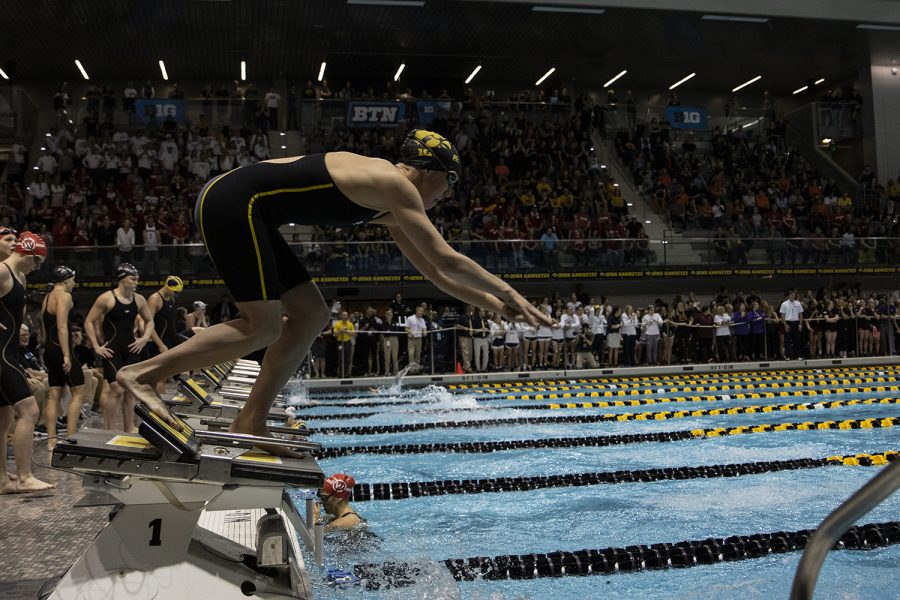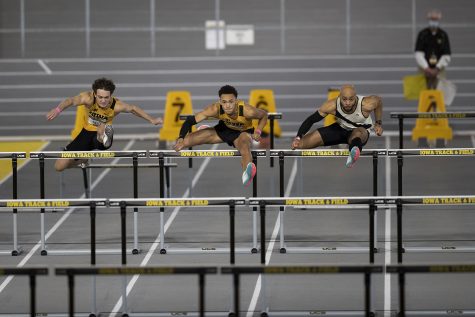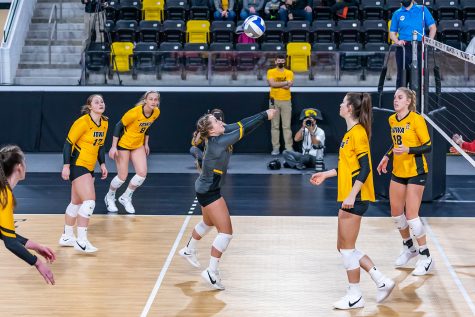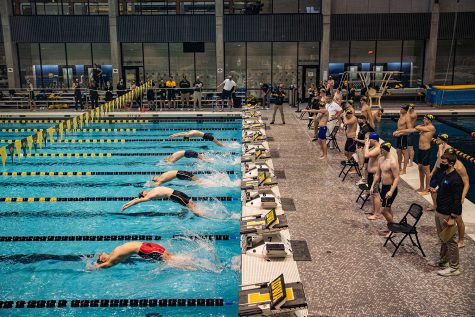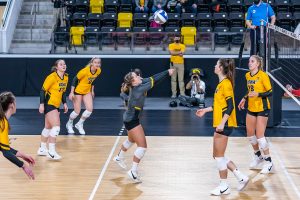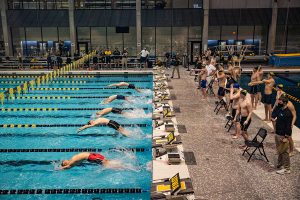University of Iowa Athletics reinstates women’s swimming and diving program
After a months-long legal battle, Iowa women’s swim and dive is officially here to stay.
Hawkeyes compete in the 400 yard freestyle during the last session of the 2020 Women’s Big Ten Swim and Dive Championship on Saturday, Feb. 22, 2020 at the Campus Recreation and Wellness Center. Ohio State won the championships with an overall score of 1503.5.
February 16, 2021
Seven months ago, on Aug. 21, the lives of about 100 student-athletes and staff members across four University of Iowa Athletics programs were upended, as UI leadership announced its men’s and women’s swimming and diving, men’s gymnastics, and men’s tennis teams would be cut at the end of the 2020-21 academic year.
At the time, the move appeared to be permanent. Now, one of the four discontinued sports is making a return.
“I received the news the same time that the world did,” Iowa women’s swimmer Sage Ohlensehlen said. “We were at practice and we were told we had an urgent meeting, and that Athletic Director Gary Barta was going to come to the pool and talk to us. So, we were all very excited. We met in the team room and waited for about 15 minutes. I think Gary came in at about 2:15 [Monday] and told us that we were reinstated.”
The UI’s decision to voluntarily reinstate its women’s swimming and diving program comes after a months-long legal battle with Ohlensehlen and her teammates — senior Kelsey Drake, sophomore Christina Kaufman, and freshman Alexa Puccini.
The four swimmers alleged that the UI’s decision to cut women’s swimming and diving made it non-compliant with Title IX of the education amendments of 1972.
Since the Title IX complaint was filed Sept. 25, a federal judge granted the plaintiffs a preliminary injunction Dec. 24, blocking the UI from cutting its NCAA Division I women’s swimming and diving team.
“We are fully reinstating [the women’s swimming program],” Barta said at a teleconference with reporters Tuesday. “. . . It’s permanent like every other Olympic sport we have or any sport we have. It’s a permanent decision. They are fully reinstated and full members of the athletic department, and I have zero plans to cut any sports, including women’s swimming, beyond this point.”
The Title IX suit is currently ongoing, as the plaintiffs still believe UI Athletics is Title IX non-compliant, despite the return of women’s swimming.
RELATED: Iowa reverses decision to cut women’s swimming and diving program amid Title IX battle
“We work right off the Office of Civil Rights’ methodology of counting,” Barta said. “We’ve been committed to being Title IX compliant. We’ll remain committed to being in Title IX compliance.”
But the other three programs the UI plans to discontinue won’t meet the same fate, UI officials stressed.
“[The deficit is] still a huge number,” Barta said. “Thankfully, it’s less than $75 million, but it’s still between $50 and 60 million. The uncertainty that I talked about earlier is still in front of us. So, I don’t know exactly how big the deficit is going to be, but it’s going to be large. As a result of that, we are not able to reinstate the other three programs that are being discontinued.”
Iowa athletics isn’t the only area of the UI budget that’s taken a beating — UI President Bruce Harreld told lawmakers earlier this month the UI lost $13.7 million from refunds and lost revenue, reductions of $14.8 million from less tuition revenue, and $3.1 million less from state appropriations. In total with UI athletics estimated $50 million, Harreld reported the pandemic lost the university $83.4 million.
Barta also noted that playing a partial football schedule in the fall and rolling out furloughs, layoffs, budget cuts, and salary reductions have helped Iowa chip the deficit down to the $50-60 million range.
Uncertainty surrounding the 2021 NCAA men’s basketball tournament, and the attendance and scheduling measures implemented for the 2021 NCAA football season are factors Barta said signal that current cost-cutting efforts must be upkept.
The Save Iowa Sports group — a coalition of Iowa swim and dive alumni and friends — have proposed alternatives to save the other three sports, including removing Olympic sports from Iowa Athletics’ supervision. The group also kickstarted fundraising efforts to help men’s tennis, men’s swim and dive, and men’s gymnastics earn reinstatement.
The UI has rejected the alternative plan and hasn’t accepted Save Iowa Sports’ dollars.
Barta said the UI has explored options to revive the three sports set to be eliminated, and that the money raised to save the programs was only enough to cover the operating costs of men’s and women’s swimming for a year.
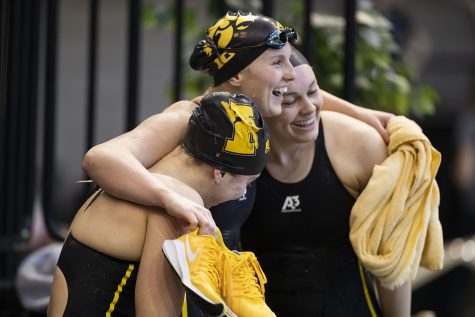
Iowa is not alone in overturning recent sports cuts.
In January, Dartmouth reinstated five varsity sports programs it cut in January after the threat of a Title IX complaint. William & Mary also reversed course in November, reversing an earlier decision to cut three men’s sports. The school said it will support the programs through at least the 2021-22 academic year while developing a financial plan to keep them sustainable.
Barta reiterated that UI Athletics is looking for long-term solutions, rather than short-term answers.
“I wish Iowa would’ve engaged with the Save Hawkeye Sports group,” group member and UI alum Mark Kaufman said. “…We’ve never received a true indication or process that you’d think an athletic department with a huge deficit would be chasing down every potential rabbit hole for an opportunity to help balance the books, create revenue, and support all the athletes.”
Budget and program cuts aside, the challenges associated with reinstating women’s swim and dive still loom.
This season, the Hawkeyes have competed with about 10 fewer athletes than they did in 2019-20. Iowa’s coaching staff also shrunk from seven to four people prior to the 2020-21 campaign.
Despite that, head coach Marc Long said he and his staff are still trying to prepare their student-athletes to compete as best they can, specifically for upcoming Big Ten and NCAA Championship meets.
Trust issues, according to both Ohlensehlen and Barta, will likely continue to persist as well. Both, however, believe time can mend the fences that have divided Iowa Athletics and its women’s swimming and diving program.
“Emotionally, it’s difficult to put on a cap with a Hawkeye on it knowing that your school doesn’t support you,” Ohlensehlen said. “That is something that I’ve been wrestling with emotionally. Today, I’m wearing Iowa stuff, but yesterday, I was not. It’s very hard to put on the Tigerhawk, but now I’m going to wear it so proudly. I think the university made the right decision. Obviously, it took them a long time to get to this decision, but nonetheless, they made it. It’s been such a hard past seven months, but there’s a light at the end of the tunnel.”



